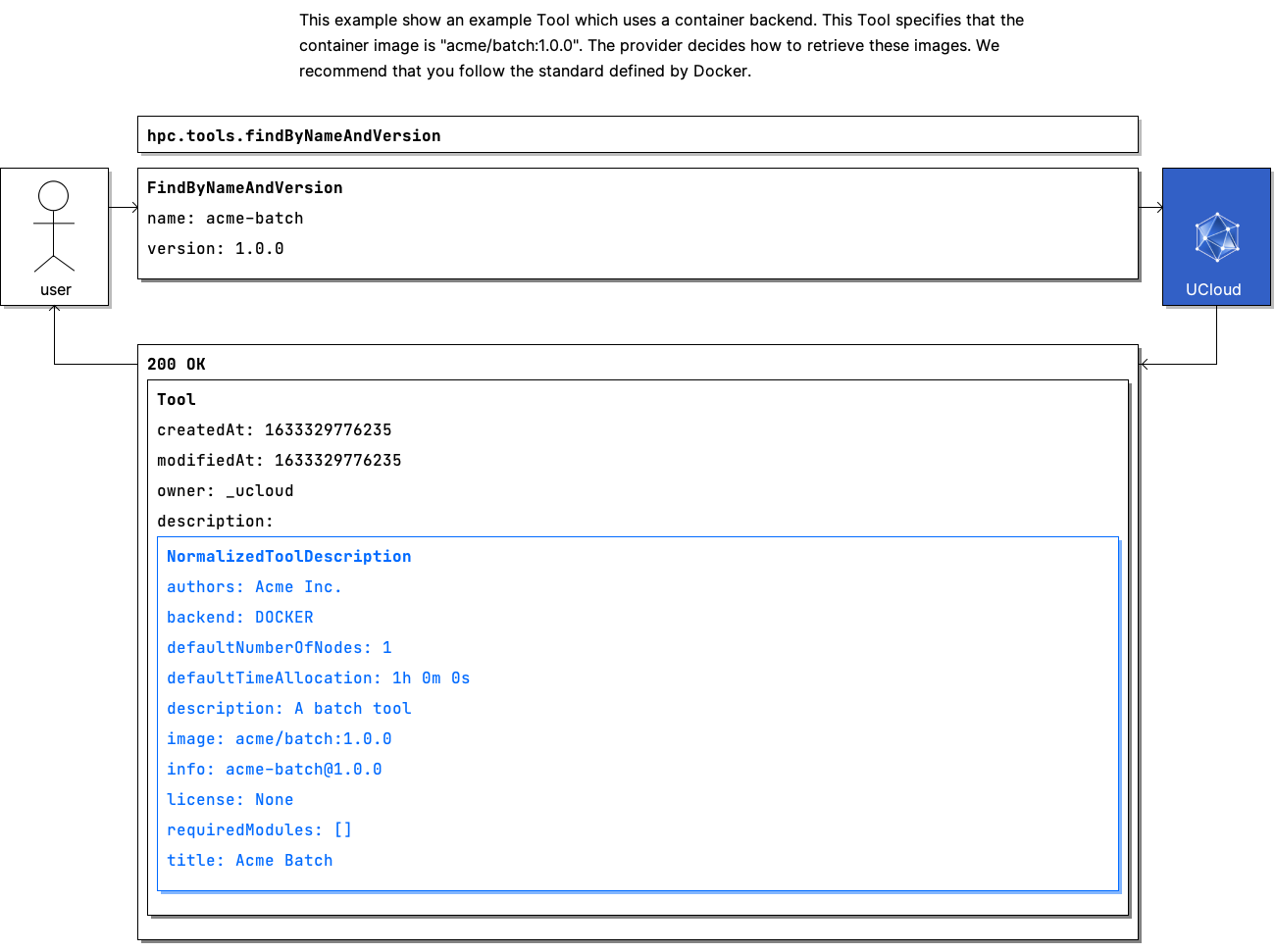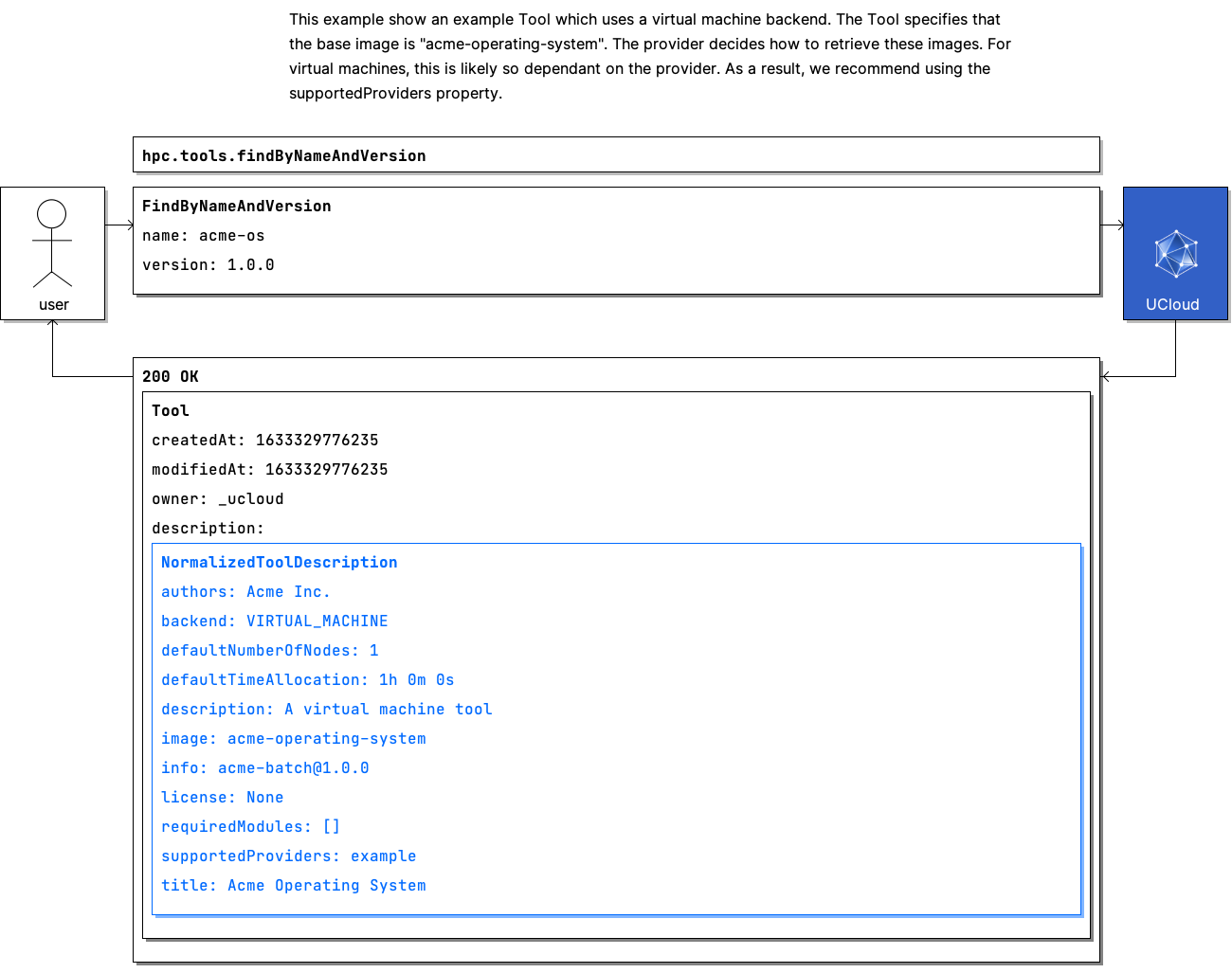Tools¶
Tools define bundles of software binaries and other assets (e.g. container and virtual machine base-images).
Rationale¶
All Applications in UCloud consist of two components: the
Tool and the Application The Tool defines the computational environment. This includes
software packages and other assets (e.g. configuration). A typical example would be a base-image for a container or a
virtual machine. The Application describes how to invoke the Tool. This includes specifying the
input parameters and command-line invocation for the Tool.
⚠️ WARNING: The API listed on this page will likely change to conform with our API conventions. Be careful when building integrations. The following changes are expected:
RPC names will change to conform with the conventions
RPC request and response types will change to conform with the conventions
RPCs which return a page will be collapsed into a single
browseendpointSome property names will change to be consistent with
Resources
Table of Contents¶
2. Remote Procedure Calls
| Name | Description |
|---|---|
findByName |
Finds a Page of Tools which share the same name |
findByNameAndVersion |
Finds a Tool by name and version |
create |
Creates a new Tool and adds it to the internal catalog |
3. Data Models
| Name | Description |
|---|---|
Tool |
Tools define bundles of software binaries and other assets (e.g. container and virtual machine base-images). |
NormalizedToolDescription |
The specification of a Tool |
FindByNameAndVersion |
A request type to find a resource by name and version |
NameAndVersion |
A type describing a name and version tuple |
SimpleDuration |
No description |
ToolBackend |
No description |
FindByNameRequest |
Request type to find a Page of resources defined by a name |
Example: Retrieve a container based Tool¶
| Frequency of use | Common |
|---|---|
| Actors |
|
Communication Flow: Kotlin
/* This example show an example Tool which uses a container backend. This Tool specifies that the
container image is "acme/batch:1.0.0". The provider decides how to retrieve these images. We
recommend that you follow the standard defined by Docker. */
ToolStore.findByNameAndVersion.call(
FindByNameAndVersion(
name = "acme-batch",
version = "1.0.0",
),
user
).orThrow()
/*
Tool(
createdAt = 1633329776235,
description = NormalizedToolDescription(
authors = listOf("Acme Inc."),
backend = ToolBackend.DOCKER,
container = null,
defaultNumberOfNodes = 1,
defaultTimeAllocation = SimpleDuration(
hours = 1,
minutes = 0,
seconds = 0,
),
description = "A batch tool",
image = "acme/batch:1.0.0",
info = NameAndVersion(
name = "acme-batch",
version = "1.0.0",
),
license = "None",
requiredModules = emptyList(),
supportedProviders = null,
title = "Acme Batch",
),
modifiedAt = 1633329776235,
owner = "_ucloud",
)
*/
Communication Flow: Curl
# ------------------------------------------------------------------------------------------------------
# $host is the UCloud instance to contact. Example: 'http://localhost:8080' or 'https://cloud.sdu.dk'
# $accessToken is a valid access-token issued by UCloud
# ------------------------------------------------------------------------------------------------------
# This example show an example Tool which uses a container backend. This Tool specifies that the
# container image is "acme/batch:1.0.0". The provider decides how to retrieve these images. We
# recommend that you follow the standard defined by Docker.
# Authenticated as user
curl -XGET -H "Authorization: Bearer $accessToken" "$host/api/hpc/tools/byNameAndVersion?name=acme-batch&version=1.0.0"
# {
# "owner": "_ucloud",
# "createdAt": 1633329776235,
# "modifiedAt": 1633329776235,
# "description": {
# "info": {
# "name": "acme-batch",
# "version": "1.0.0"
# },
# "container": null,
# "defaultNumberOfNodes": 1,
# "defaultTimeAllocation": {
# "hours": 1,
# "minutes": 0,
# "seconds": 0
# },
# "requiredModules": [
# ],
# "authors": [
# "Acme Inc."
# ],
# "title": "Acme Batch",
# "description": "A batch tool",
# "backend": "DOCKER",
# "license": "None",
# "image": "acme/batch:1.0.0",
# "supportedProviders": null
# }
# }
Communication Flow: Visual

Example: Retrieve a virtual machine based Tool¶
| Frequency of use | Common |
|---|---|
| Actors |
|
Communication Flow: Kotlin
/* This example show an example Tool which uses a virtual machine backend. The Tool specifies that
the base image is "acme-operating-system". The provider decides how to retrieve these images. For
virtual machines, this is likely so dependant on the provider. As a result, we recommend using the
supportedProviders property. */
ToolStore.findByNameAndVersion.call(
FindByNameAndVersion(
name = "acme-os",
version = "1.0.0",
),
user
).orThrow()
/*
Tool(
createdAt = 1633329776235,
description = NormalizedToolDescription(
authors = listOf("Acme Inc."),
backend = ToolBackend.VIRTUAL_MACHINE,
container = null,
defaultNumberOfNodes = 1,
defaultTimeAllocation = SimpleDuration(
hours = 1,
minutes = 0,
seconds = 0,
),
description = "A virtual machine tool",
image = "acme-operating-system",
info = NameAndVersion(
name = "acme-batch",
version = "1.0.0",
),
license = "None",
requiredModules = emptyList(),
supportedProviders = listOf("example"),
title = "Acme Operating System",
),
modifiedAt = 1633329776235,
owner = "_ucloud",
)
*/
Communication Flow: Curl
# ------------------------------------------------------------------------------------------------------
# $host is the UCloud instance to contact. Example: 'http://localhost:8080' or 'https://cloud.sdu.dk'
# $accessToken is a valid access-token issued by UCloud
# ------------------------------------------------------------------------------------------------------
# This example show an example Tool which uses a virtual machine backend. The Tool specifies that
# the base image is "acme-operating-system". The provider decides how to retrieve these images. For
# virtual machines, this is likely so dependant on the provider. As a result, we recommend using the
# supportedProviders property.
# Authenticated as user
curl -XGET -H "Authorization: Bearer $accessToken" "$host/api/hpc/tools/byNameAndVersion?name=acme-os&version=1.0.0"
# {
# "owner": "_ucloud",
# "createdAt": 1633329776235,
# "modifiedAt": 1633329776235,
# "description": {
# "info": {
# "name": "acme-batch",
# "version": "1.0.0"
# },
# "container": null,
# "defaultNumberOfNodes": 1,
# "defaultTimeAllocation": {
# "hours": 1,
# "minutes": 0,
# "seconds": 0
# },
# "requiredModules": [
# ],
# "authors": [
# "Acme Inc."
# ],
# "title": "Acme Operating System",
# "description": "A virtual machine tool",
# "backend": "VIRTUAL_MACHINE",
# "license": "None",
# "image": "acme-operating-system",
# "supportedProviders": [
# "example"
# ]
# }
# }
Communication Flow: Visual

Remote Procedure Calls¶
findByName¶
Finds a Page of Tools which share the same name
| Request | Response | Error |
|---|---|---|
FindByNameRequest |
Page<Tool> |
CommonErrorMessage |
findByNameAndVersion¶
Finds a Tool by name and version
| Request | Response | Error |
|---|---|---|
FindByNameAndVersion |
Tool |
CommonErrorMessage |
create¶
Creates a new Tool and adds it to the internal catalog
| Request | Response | Error |
|---|---|---|
Unit |
Unit |
CommonErrorMessage |
Data Models¶
Tool¶
Tools define bundles of software binaries and other assets (e.g. container and virtual machine base-images).
data class Tool(
val owner: String,
val createdAt: Long,
val modifiedAt: Long,
val description: NormalizedToolDescription,
)
See Tools for a more complete discussion.
Properties
owner: String
String
createdAt: Long
Long
modifiedAt: Long
Long
description: NormalizedToolDescription
NormalizedToolDescriptionNormalizedToolDescription¶
The specification of a Tool
data class NormalizedToolDescription(
val info: NameAndVersion,
val container: String?,
val defaultNumberOfNodes: Int,
val defaultTimeAllocation: SimpleDuration,
val requiredModules: List<String>,
val authors: List<String>,
val title: String,
val description: String,
val backend: ToolBackend,
val license: String,
val image: String?,
val supportedProviders: List<String>?,
)
Properties
info: NameAndVersion
NameAndVersion
container: String?
String?
defaultNumberOfNodes: Int
Int
defaultTimeAllocation: SimpleDuration
SimpleDuration
requiredModules: List<String>
List<String>The provider decides how to interpret this value. It is intended to be used with a module system of traditional HPC systems.
title: String
String
description: String
String
backend: ToolBackend
ToolBackend
license: String
String
image: String?
String?This value depends on the backend used for the Tool:
DOCKER: The image is a container image. Typically follows the Docker format.VIRTUAL_MACHINE: The image is a reference to a base-image
It is always up to the Provider how to interpret this value. We recommend using the supportedProviders
property to ensure compatibility.
supportedProviders: List<String>?
List<String>?This property determines which Providers are supported by this Tool. The backend will not allow a user to launch an Application which uses this Tool on a provider not listed in this value.
If no providers are supplied, then this Tool will implicitly support all Providers.
FindByNameAndVersion¶
A request type to find a resource by name and version
data class FindByNameAndVersion(
val name: String,
val version: String,
)
NameAndVersion¶
A type describing a name and version tuple
data class NameAndVersion(
val name: String,
val version: String,
)
SimpleDuration¶
data class SimpleDuration(
val hours: Int,
val minutes: Int,
val seconds: Int,
)
ToolBackend¶
enum class ToolBackend {
SINGULARITY,
DOCKER,
VIRTUAL_MACHINE,
NATIVE,
}
Properties
SINGULARITY
DOCKER
VIRTUAL_MACHINE
NATIVE
FindByNameRequest¶
Request type to find a Page of resources defined by a name
data class FindByNameRequest(
val appName: String,
val itemsPerPage: Int?,
val page: Int?,
)




